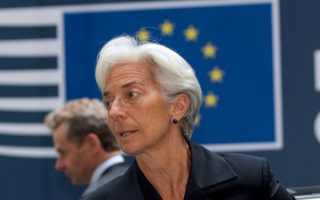IMF’s position becomes clearer

The role of the International Monetary Fund in the Greek bailout program is in the spotlight again after it published its fiscal and growth forecasts for Greece last week, ahead of talks between the Fund’s Managing Director Christine Lagarde and top Greek officials.
The publication of the IMF’s Fiscal Monitor and World Economic Outlook could not have been more timely. The reports, which cover the world’s economies, were made public just a few days before Finance Minister Euclid Tsakalotos was due to meet Lagarde in Washington (on Saturday) and Prime Minister Alexis Tsipras’s visit to the US capital.
It was also only a matter of days before the institutions’ mission chiefs return to Athens with the aim of assessing whether everyone’s hopes of concluding the third review before the end of year can materialize. The representatives of Greece’s four biggest lenders are expected back in town on October 23.
Athens has repeatedly suggested that the stance taken by the IMF may be the biggest factor in determining whether there is a chance the review will be concluded swiftly or not. It is no wonder, then, that everyone looked at the Fund’s projections for the Greek economy in the hope of finding clues that might shed light on its intentions.
On the macroeconomic side, the IMF sees the economy growing by 1.8 percent this year, which is in line with the Greek government’s expectations, but lower than the 2.1 percent that the Fund had estimated in July. Athens and its creditors expect there to be roaring growth in the final quarter of the year. The Fund expects gross domestic product to increase by 3.6 percent in Q4 compared to a year earlier, although this is largely as a result of the very weak economic performance at the tail end of 2016.
The Washington-based organization also expects that the Greek economy will grow by 2.6 percent next year, which is slightly up on a previous IMF estimate of 2.4 percent. So far, so good for Greece and the government.
However, the IMF continues to believe that Greece’s growth prospects beyond the next few years are far from spectacular. It expects the annual growth rate to ease to 1 percent from 2022 onward. This underlines one of the biggest challenges that Greek decision makers will face once the country is out of the current program, which is how they are going to secure the high level of investment needed to maintain growth at decent levels once the initial bounce has worn off.
On the fiscal side, the IMF estimates the overall fiscal balance to come to rest at a deficit of -1.7 percent of GDP this year and -1.1 percent of GDP in 2018, before Greece produces a once-unthinkable overall surplus of 0.2 percent of GDP in 2019.
A primary surplus of 1.7 percent of GDP is expected this year and 2.2 percent in 2018, before hitting the program target of 3.5 percent of GDP in 2019 and being maintained at that level until 2022.
There was some confusion regarding the IMF’s primary surplus forecast for next year, which was substantially below the 2018 program target of 3.5 percent. However, the Fund had already made it clear in the summer, when the second review was concluded, that it is satisfied with a 2.2 percent primary surplus for next year and does not want Athens to adopt further measures to increase this to 3.5 percent, which is the goal set by the European lenders in the European Stability Mechanism (ESM) program.
The July staff report prepared by IMF experts states, “Should Greece fully satisfy policy commitments and achieve the fiscal targets established in the Fund arrangement but not the ESM program targets, European partners have agreed that access to ESM disbursements would continue and that ESM targets would be reviewed.”
This means that the Greek government may avoid this time the usual pattern that the closure of reviews take, which is the IMF pressing for more fiscal measures to meet the targets set by the Europeans and the latter group of lenders not being willing to adjust those goal downward. This has led to Athens having to legislate at the last minute new batches of spending cuts or tax hikes to smooth things over.
While this will probably not be on the agenda this time, the position of the Europeans is not yet known. They are still expecting a 3.5 percent of GDP primary surplus next year and if they do not think that looks likely based on this year’s performance, they could be the ones asking for more measures this time.
Also, it should not be forgotten that the IMF has publicly suggested that the pension cuts (1 percent of GDP) scheduled for 2019 and the lowering of the tax-free threshold for incomes (another 1 percent of GDP), which is due in 2020, may be needed sooner.
The reason for this is evident in the documents published by the IMF. The Fund has substantially more conservative estimates than Greece and the European lenders on tax revenues, expenditure and economic growth. The difference in these areas adds up to nearly 4 percent of GDP by 2021. This does not account for the impact of the pension and tax measures due to be implemented in the coming years.
On revenues, which are already a concern for the Greek authorities as targets are being missed, the IMF believes that lower amounts will be collected partly because there will be a rise in the number of low-income earners who dip below the tax-free threshold.
In terms of spending, the IMF expects that expenditure on pensions will increase by 1 percent a year, a legacy of Greece’s aging population.
It should be remembered, though, that for all the key numbers on the Greek side, the Fund is also focused on some very important figures that have to do with Greece’s creditors. The IMF is still insisting that the eurozone needs to address the Greek national debt issue and this could yet prove to be one of the main sticking points as the end of the third bailout program in August 2018 approaches.
The third review will have to be wrapped up first, and there are still many tasks to be completed before this is achieved, but once that is done, the Fund expects that a serious discussion on debt relief will take place. For now, though, everyone’s focus will be on the next few weeks and making sure that they are satisfied that their numbers add up.





